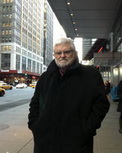 Chris
McDonnell, UK
Chris
McDonnell, UK
chris@mcdonnell83.freeserve.co.uk
Previous articles by Chris Comments
welcome here
May 3, 2017
You
have an opinion?

Addressing
the Speaker of the House, the late Tony Benn used these words. “I
must tell you Mr Speaker, that I am going to put a plaque in the House. I
shall have it made myself and screwed on the door of the broom cupboard in
the Crypt”.
Benn’s
words to the Speaker in 2001 referred to the plaque he had made to
commemorate the action of a suffragette, Emily Wilding Davison, who on the
night of the 1911 census, hid herself in a broom cupboard so that she
could claim residency in the House on her Census Return. She was later to
die, in June 1913, when she threw herself under the King’s horse at the
Derby
.
And
all this in support for the right of women to vote, a right we assume now
for any civilised democracy. But do we value the opportunity we have in an
Election of signifying that our choice may differ from that of others?
When the first post-apartheid Election took place in South Africa, people,
both men and women, queued for many hours to register the first vote of
their life time, it mattered that much.
It feels as though in
recent months we have lived a continuous voting experience. With the
Scottish referendum on
Independence
rejected by a narrow majority in 2014 (and with
another one hovering over the hill), followed by the referendum on
Europe
last June, a new flavour was put on the table. In our
parliamentary democracy, a Referendum on a single issue determined by a
simple majority vote is not the usual pattern of doing business but on
these occasions it was used and has had a significant effect on the
direction the
UK
is taking.
Now another General
Election has been called and in the coming days we will be inundated with
words and images, encouraging us to vote for a good principle or to vote
against some person or idea.
In
France
this Sunday, May 7th, we will see the final
resolution in the play-off between Le Pen and Macron, a result that could
bolster the EU or lead to its complete break up.
Where is the Church in
all of this? If a priest or bishop declares for a particular candidate,
then he is often accused of trying to influence the vote. To that we must
hold up our hands and agree that is the intention. The question we should
be asking lies beyond that. How has his opinion been reached? What
motivates the decision to come down on one side or another?
Too
often, the Church through its clergy has found themselves on the wrong
side historically. In
Spain
, the support for Franco against the Republicans was
clear, in
France
and
Germany
the opposition to Fascist regimes was at best muted,
in
South America
, many of the dictatorships were supported by the
national hierarchy. Yet it was never total. There were always those whose
courage enabled them to speak out. Dom Helder Camara, Archbishop of Recife
in
Northern Brazil
once famously said: "When
I feed the poor they call me a saint. When I ask why so many people are
poor they call me a communist”. His was one of the few voices that
spoke up for the people and their freedom in the face of oppression.
Archbishop
Oscar Romero was another and he ended up losing his life for his
willingness to protest injustice.
Closer
to our time, it is worth remembering that a considerable number of
Catholics, 52%, voted for Trump. The reasons were no doubt complex, with
dislike of some of the moral standpoints supported by
Clinton
crucial. Now we have the ultimate insecurity of
Trump’s finger on the nuclear button, a huge question of morality if
ever there was one. He has recently been described as ’unstable,
unpredictable and impulsive’ by a gathering of psychiatrists in
Washington
DC
.
Which leads us back to
our own responsibility, to have a considered, well thought-through opinion
and to exercise our voting right from a clear standpoint. That involves a
perceptive listening to the Gospel, an appreciation of mission and to
realise that as Fr Daniel O’Leary puts it, when we share in the
Eucharist at mass, the Lord is in our homes waiting to greet us when we
get back.
Democracy
is never straight forward, it takes time to evolve in a culture of change
and its success is determined by how much it is explained and valued. Too
often we have sought to impose western democracy on developing countries
ill-prepared for the radical idea of one person, one vote. Maybe we should
go gently and assist with understanding. A small plant needs water for
growth, not the raging torrent of a storm.
END
----------------------
 Chris
McDonnell, UK
Chris
McDonnell, UK Chris
McDonnell, UK
Chris
McDonnell, UK